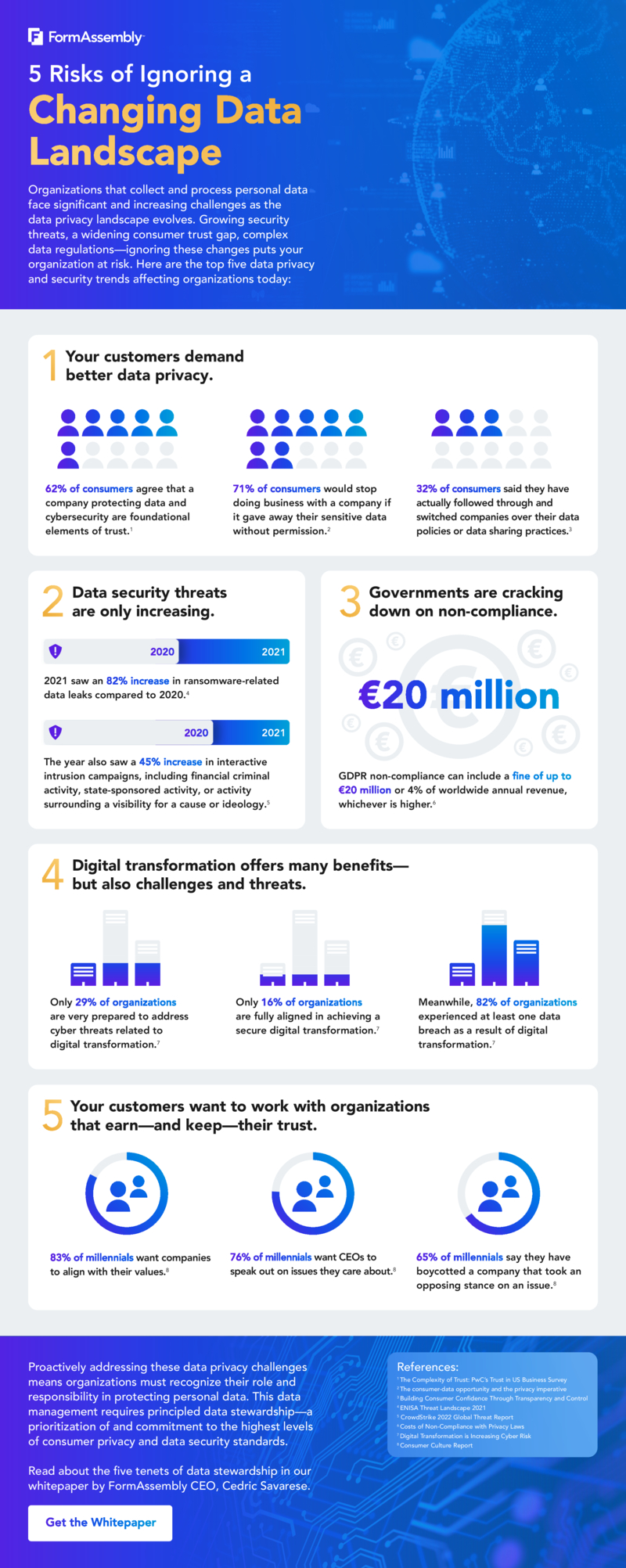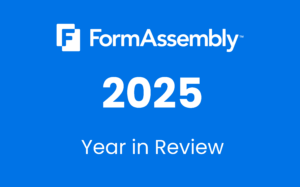At FormAssembly, we believe that it is time to adopt a modern, proactive approach to data management, usage, and security. While many organizations practice a data ownership mindset, we believe that the future is data stewardship.
What is data stewardship? Data stewardship is an umbrella term that encompasses best practices concerning the collection, use, and confidentiality of personal information. We have a responsibility to those who share their data to adopt an offensive strategy that protects them.
Holding onto the outdated data ownership mindset puts your organization at risk. This mindset can lead members of your organization to be careless with the data entrusted to them or to collect data that isn’t necessary to your business needs. This leaves you vulnerable to cyber attacks, non-compliance with laws and regulations, and losing your customers’ trust.

Are you ready to modernize your approach to data management? There are five core tenets of proper data stewardship to help guide your policies and processes.
1. Fairness
In order to practice proper data stewardship, your processes and policies must be fair to those who are sharing their data. Your data collection processes must include informed consent. Make clear and conspicuous disclosures. Your organization should make all of the material terms of an offer clear and conspicuous and display the terms upfront.
Being fair also means avoiding deceptive design practices like trick questions, deceiving customers into giving personal information, misdirection, and shaming consumers into consent. Such practices may deceive consumers into making decisions that are contrary to their intent.
2. Transparency
In order to provide opportunities for informed consent, your organization needs to be transparent about what data is collected and how it is used. Your data collection processes must clearly communicate:
- How you intend to use the data
- Whether the data will be shared with third parties
- How they can exercise their rights
This information shouldn’t be buried in a privacy policy, but also included in plain language at the point of collection. Clearly communicating your policies and practices is an opportunity to build trust with your customers.
>>Whitepaper: Understanding the Importance of Data Stewardship<<
3. Relevancy
The data collected must be limited to that which is relevant for the intended purpose of collection. Collecting more data than is necessary puts your organization and your customers’ information at risk.
Minimzing your data collection is also a great opportunity to improve your user experience. Collecting data you don’t really need or you already causes unnecessary frustration and wastes time for your customers. Data collection solutions like FormAssembly can help you improve your customer experience by only requesting the data you need.
4. Lawfulness
Your data collection should comply with any relevant laws and regulations. This one is pretty straightforward and hopefully a standard part of your polices and practices today.
That said, compliance will be an ongoing challenge. Your organization may be required to comply with a complicated mix of state, federal, and international laws in addition to industry regulations, each of which goes through periodic updates. Partnering with the right vendors who priortize compliance can put you one step ahead of the game. FormAssembly offers data collection that is compliant with HIPAA, GDPR, CCPA, GLBA, and is FedRAMP Ready.
5. Security
From the moment you collect the data, your organization should take reasonable and appropriate steps to minimize the risk and consequences of a data breach. The first step can be to audit the data you collect and the associated processes. You’ll also want to implement extensive security training and policies for employees. Cyber insurance is also strongly advised.
Partnering with vendors who prioritize security is key to proper data stewardship. Whether they have access to the data or—like FormAssembly—simply facilitate the collection but do not directly access the data, it’s important to have a clear understanding of their security protocols.
Why FormAssembly data collection is key to proper data stewardship
Data collection can be fraught with risks—many people throughout your organization collecting and managing data in different ways can lead to vulnerabilities. At FormAssembly, data stewardship is at the core of everything we do. We practice data stewardship internally, but we also make it our goal to help our customers practice it with their own data collection initiatives.
As a result, we have taken considerable steps to ensure that the data of our customers and employees is protected by the most advanced security and compliance standards. These standards adhere to national and international data privacy laws, including HIPAA, GLBA, and GDPR. We are also PCI DSS Level 1 Certified, SOC 2 compliant, and maintain FedRAMP Ready status. By leveraging FormAssembly, our customers can maintain good data stewardship practices that keep sensitive data compliant and secure amidst evolving privacy regulations and growing threats.
